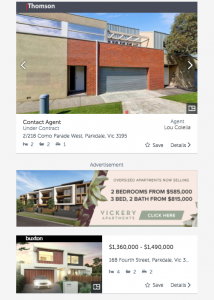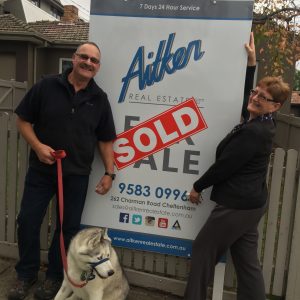Earlier this year, Aitken Real Estate’s Managing Director, Stephen Aitken, created a video discussing advertising and marketing in real estate. As a seller, there’s a lot to learn, so we’ve compiled the key takeaways to ensure you’re getting the most amount of money for your home without spending thousands on unnecessary advertising.
The hidden agenda in most of vendor paid advertising
Most people don’t realise a lot of advertising actually benefits the agent by promoting and profiling themselves.
When agents are selling in a particular suburb, they’re asking vendors to pay substantial advertising fees to find buyers and they’ll repeat this exercise on a house in the same street, the next street and around the corner. The question you have to ask of that office or any other real estate agency, is why do I have to keep paying all this money when you’re a real estate office? Don’t you keep a record of all those buyers you’ve previously advertised to? Where are they?
There’s a difference between what you need to sell your home and what agents would have you pay in advertising…
 Internet
Internet
The first thing you actually need to sell your home is the Internet. In Victoria, the dominant real estate portal is realestate.com.au and in NSW it’s Domain. Agents force sellers to pay for feature properties on these sites when in reality, genuine buyers will look at all pages on a website, not just the first page with the feature properties. Of course lookers will stop at page one, but real buyers will look at page one, page five and if there’s 30 pages of properties within their criteria, they’ll go through 30!
Think about it, when you’re looking to buy anything on eBay or Gumtree, you tend to do quite a lot of research and search from page one to ten.
As well as paying for unnecessary feature properties online, you’re also paying to boost your agent’s profile!
There is also some conjecture about listing the property address online. At Aitken Real Estate, we don’t advertise your address. We advertise a suburb and a price because we want to get that buyer enquiry in front of a competent negotiator. Unfortunately today, lazy real estate is that you put the address up, wait for buyers to make a decision from photos and copy, and if they ring, good, and if they don’t, then bad luck. And what you get is sales people that aren’t sales people, they’re really just messengers. Without putting the address, there’s a great opportunity for a real estate office to gain access to buyers so we can speak to them, whether it’s the right home for them or not.
 Boards
Boards
Boards are hugely necessary, but some of them can be seen from the moon, costing between $400 and $700! And when you’re driving past at 60 or 80 km per hour, there’s no way you can read them anyway. A lot of these board feature photos of the front of the house, which is just staggering when you think about it! And like anything, you can pay for the bigger and better versions with backlit boards and lights over boards which are a great sell for vendors, they look fantastic, neighbours and friends are all impressed and agents have the opportunity to impress other potential sellers, but do they sell homes? The answer is pretty much no. Provided you’ve got a board with an agent’s name and their phone number, you’re away and racing!
Where else is your money being spent?
Copy writing
I’ve noticed agents charging for copy writing on ads. When you have a look at most property advertisements, the copy is pretty basic, but sellers are being charged $400-$600 anyway! There are actually websites where you can type in the details, features and benefits of a property and it will deliver you a fairly reasonable piece of copy to use in ads. This service costs just $145 a year and you can do as many properties as you like.
Print media
I think by now we all acknowledge that print media is dying, so why are real estate agents still charging for it? If an agent suggests print media to sell your home, ask them if they’re doing it for your benefit or are they really doing it to promote themselves?
Photography
Of course, you certainly need some decent photos of your home, but do you need dusk shots? Do you need drone shots? Do you need area shots? Probably not and if these kinds of photos are being used, why are you paying for them?
Let’s be honest, real estate photos usually fill buyers with false hope and when they visit the property, the lounge room’s much smaller than they thought, the backyard’s tiny and the painting is faded and pretty average. The buyer’s expectations have completely dropped away by the time they leave your home. That’s no way to sell anything!
You’d be vastly better to have competent, good photos that enhance the properties good points, but ultimately what you really want to do is get buyers in and have them say “I think the lounge rooms much bigger than it looks in the photos” and “I think the backyard is stunning – it didn’t look as good in the photos!” This engenders excitement in a buyer and love for the property, so you’re more likely to get a better outcome.
Staging homes
Staging homes just means preparing a home for sale, making it appeal to the highest number of potential buyers. This usually involves styled interiors and the renting of furniture.
In my early days in real estate, if someone thought of staging a home, they must’ve been selling a $20 million home, but it’s become a lot more commonplace these days. Despite this, I still contend that a competent real estate sales person can demonstrate a home’s features and benefits to a buyer without the expensive furniture and accessories. I’m not convinced staging homes makes a dollar difference to a home. It’s easier for a sales person lacking skills to sell the home styled by a professional, but a sophisticated negotiator and long-term operator in real estate doesn’t need all that!
There’s some pretty basic things you can do to get your house ready for sale. What you really need to do is de-clutter and clean your home, cut your grass and pull a few weeds from your garden. But even if you can’t do some of these things, a really good agent will be able to show a buyer through and overcome most of these problems. Remember, buyers aren’t dumb – they will look at a house and will not pay any more or any less because you have dirty dishes in the sink!
New age advertising
New age advertising includes things like 360-degree video views and video tours/walk throughs of homes. If you’re going to do all that, why not just get an advertising company to run it, sell the home yourself and save $10,000 or $15,000?
This is not how advertising and marketing used to be. The technology has changed, but the process is still the same. Selling a house is not particularly hard, as an agent of more than 30 years, selling a house is pretty straight forward. What all real estate companies, including us, are looking for is more sellers. What our clients pay us for is to get the maximum amount of money. You want someone in there batting for you, standing shoulder to shoulder with you and being able to competently explain to you why people aren’t coming through the home and why you’re not getting the results you might have been expecting.
What are the alternatives?
There are some great agents around that don’t believe vendor paid advertising is in a seller’s best interest. They believe the agents should take the risk, that if an agent is going to ask to sell your home or you’re going to give them that privilege, then they should run the risk, they should deliver the service before you pay them anything, including their fees. These are the agents you should be getting in touch with or you can give us a call at Aitken Real Estate and we can put you in contact with those agents in your local area.
Some agents, including us, prospect locally around the area – we knock on doors, tell neighbours and friends about properties because they might not have been looking for a home, but all of a sudden, they’re aware a home has come up and a friend really wants to buy in the area – that’s marketing and that’s good real estate. But again, some of these advertising programs, agents are charging for brochures, they’re charging for letterbox drops, they’re charging for all these things, whereas this is genuinely a normal part of real estate of any competent real estate sales person.
I hope we’ve been able to demonstrate at least some of the aspects of advertising and marketing in real estate. I think it’s a pretty big con that keeps growing and getting bigger and bigger! Ultimately, when you sell your home, you want to engage a genuine advocate on your behalf – a seller’s advocate. That’s what we’re paid for as agents, that’s what we’re supposed to do.
If you’d like more information, there are a couple of good books to read. If you can’t get your hands on either of these, please give us a call and we’ll send you a copy.
- Neil Jenman ‘Real Estate Mistakes,’
- Peter O’Malley ‘Real Estate Uncovered’


